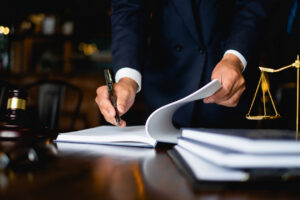
A breach of duty occurs when someone fails to meet their duty of care toward others. Duty of care refers to the responsibility to act reasonably and avoid behavior that could harm or endanger others.
The specific duty depends on the situation and is often defined by law, social norms, or ethical standards. When a person fails to uphold this duty, they create a dangerous situation, leading to what is considered a breach of duty.
In a personal injury case, the plaintiff must first prove that the defendant had a duty of care and then a breach of duty under the circumstances. From there, a plaintiff must prove the defendant’s breach of duty caused injury and damages to the accident victim.
If you were injured in an accident caused by someone else’s breach of duty, you could be entitled to financial compensation. The Orlando injury lawyer at Norden Leacox Accident & Injury Law can help. Call our law offices to schedule your free consultation.
The Elements of a Florida Personal Injury Claim

Succeeding in a personal injury case means you’ll need to prove that the other party’s negligence led to your injuries. Four essential elements of a negligence claim need to be shown to prove negligence.
“Elements” in a legal case are like pieces of a puzzle. The elements of a negligence claim are:
- Duty
- Breach of Duty
- Causation
- Damages
Only if each of these elements is met can a plaintiff win their case in a personal injury lawsuit. The following information elaborates on each of these elements, with a detailed explanation of the “breach of duty” element.
- Duty of Care
A duty of care must exist for a breach of duty to happen. Duty depends on the situation involved. We all carry certain duties to act responsibly, safely, and with caution toward others. Duties in any situation will involve the relationships between individuals and others in a certain setting.
The standard of care usually revolves around the concept of the reasonable person standard. This means that, while a person is not expected to act perfectly at all times, they are expected to use a certain level of care and caution that a “reasonable person” would. Jurors in a personal injury trial will be asked to measure the defendant against a reasonable person in their scenario.
- Breach of Duty
After duty is proven, the question turns to whether a breach of duty occurred. To breach their duty of care, a person must have failed to act as a reasonable or ordinary person would have under the circumstances.
In a car accident, breach can often be shown in the way a crash occurred, such as failing to stop at a stop sign, speeding excessively, or driving recklessly. In medical malpractice claims, on the other hand, the actions of a health care provider must be compared to what a similar provider with the same training and experience would have done. Often, this will require expert testimony to prove the duty of care and how it was breached.
Another common example would be dog bite incidents where an owner fails to leash or restrain their dog according to local ordinances. In these situations, the mere fact that a dog was loose will often prove breach of duty.
Evidence That Can Prove Breach of Duty
Breach of duty in a personal injury case needs evidence to support the element. Your personal injury lawyer will carefully review all evidence to prove not only that a duty existed but that it was breached and caused your injuries.
Evidence proving breach of duty can include:
- Eyewitness testimony
- Testimony and reports from police officers at the scene
- Video footage and surveillance camera recordings
- Photos from the accident scene
- Physical evidence collected at the accident site
- Your own testimony
- Testimony given by accident reconstruction experts
- Reports and testimony from other expert witnesses.
Evidence will be given to insurance companies during the insurance claims process and also shown as evidence in your personal injury case. If need be, your lawyer will present all evidence to a jury as part of your personal injury trial. Evidence is critical to maximizing your financial recovery after an accident, and a personal injury lawyer will help you collect all evidence available.
- Causation
The causation element examines whether the defendant’s breach of duty directly led to your injuries. It requires a clear and unbroken chain of events linking the defendant’s actions—or lack of action—to the harm you suffered. In other words, you must prove that the defendant’s conduct was not only negligent but also the direct cause of your damages, with no intervening factors that could break the chain of responsibility. This connection is crucial in establishing liability in a personal injury case.
- Damages
Once duty, breach of duty, and causation have been established, the next critical step is proving damages. This involves demonstrating the specific losses you’ve suffered as a result of the accident. In a personal injury case, damages can take many forms. Proving the full extent of your damages is essential for ensuring that you receive fair compensation for all the harm you’ve endured.
Our Orlando Personal Injury Lawyers Can Help You
After an accident, you may be struggling physically, emotionally, and financially. Our experienced Orlando personal injury lawyers at Norden Leacox Accident & Injury Law can help you prove breach of duty in a personal injury case while fighting for your financial recovery. Contact our law offices today at (407)-801-3000 to set up your free consultation.
